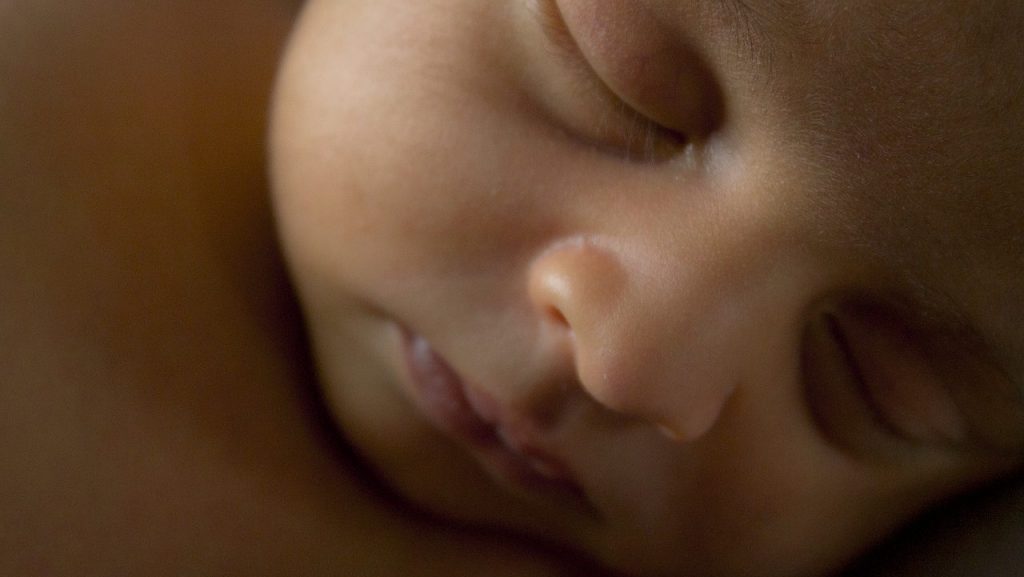Baby Sleep Tips – Making Your Baby Comfortable
Often, it seems fairly random whether or not babies sleep well. New parents will often discuss how they were simply “lucky” with one child as opposed to another. While it is true that in many cases how your child sleeps is largely out of your control, there remain many baby sleeping tips you can employ to encourage better sleeping habits. One of the most important is to ensure that your baby is comfortable when he goes to sleep.
Bedtime is a transitional period for your child, and your efforts to make him sleep better should revolve around getting him to learn to sleep on his own. One of the most important elements of achieving this is to create an environment where your baby is as comfortable as possible. For this reason, the before-bed routine should always consist of changing and feedings – the worst thing for a baby, in terms of sleeping well, is to be in want of something when he is put to bed.
You should also be trying to make your baby as physically comfortable as possible when putting him to sleep. One of the most commonly overlooked aspects of this is allowing your baby to breathe easily through the nose. Most people, but especially babies, depend on clear nasal passages for a good night’s sleep. It’s important to remove all airborne allergens in the baby’s nursery: everything should be well dusted, and you should keep dust collecting items – like fuzzy blankets and stuffed animals – to a minimum. When your baby is very young it takes time for him to learn to breathe through his mouth, so you must carefully pay attention to his nasal breathing when putting him to sleep.
You should also pay particular attention to your baby’s clothing. All babies are different in terms of their preferences, and you have to watch them closely. In many cases, things that look comfortable to you – very snug outfits, for example – may not be comfortable for your particular baby. Try both tight and loose-fitting clothes and see which ones your baby seems to prefer.
Finally, consider how well your baby sleeps with wet diapers. Most babies will sleep well through the night with a wet diaper, but some will not. If this is the case, you can often solve your baby’s sleeping difficulties by giving him a change in the night.
The main thing to keep in mind in terms of your babies comfort is to pay close attention and to trust your instincts. Although it is tempting to follow guides and stick to hard and fast rules, remember that the words of wisdom “mother knows best” is generally true. So if your baby seems uncomfortable in his clothes, don’t hesitate to change him into something that doesn’t “look” as comfortable. If you trust your own judgments over those of guides in terms of your baby’s comfort, it’s likely that he will sleep much better.
If your sleepless nights still persist and your baby and yourself cannot rest overnight, click here and try this miracle method highly recommended and used worldwide, which will help your baby sleep through the night, every night.
Baby Sleep Tips – Developing Sleep Associations
Everyone who has had the experience of being a parent knows all too well the difficulties of getting your baby to sleep soundly throughout the night. The dark circles around the eyes of new parents are usually familiar to all those that have been around them. In terms of baby tips for sleeping, one of the most important things you must try and establish as a parent is getting your baby to learn to fall asleep on his own.
The process by which your child begins to fall asleep on his own is one that involves a natural transition from falling asleep with the mother to falling asleep in an independent fashion. One of the best ways in which you can speed up this transition is to encourage your child to develop sleep associations that he or she can recreate independently.
Naturally, everyone – and babies in particular – will develop sleep associations. These are the things that you associate with bedtime and sleeping, and allow you to create an environment in which it is easy to fall asleep. When your baby is at an extremely young age, he will naturally develop sleep associations involving the mother, as he will often fall asleep in her arms. As you attempt to get your baby to sleep on his own, however, it is crucial that you work to change these associations.
If you always put your child to sleep by holding him or allowing him to use a pacifier, you create a sleep association with these things. Then, when your child wakes up in the middle of the night, he can’t go back to sleep on his own because he is unable to recreate his sleeping environment without you: he needs you to feed him or rock him in order to sleep.
As you begin to try and get your child to sleep on his own, you should introduce items into his sleeping routine that he can sleep with, such as a particular blanket or a stuffed animal. What this will do is create associations for your child with these items for sleep. Then, when he awakes in the middle of the night, he will be able to recreate a sleeping environment without your assistance by grabbing his stuffed animal, etc.
It can also be beneficial to introduce “transitional items” into your baby’s bedtime routine: Allow him to have his stuffed animal or blanket with him during a final feeding and before bedtime activities, and allow him to take these things with him to bed.
No matter what you do, your child is going to be creating his or her own sleep associations. Your job is to try and create associations with items that are under his or her control. By giving your child as much control over his sleeping environment as possible, you allow him to begin to achieve sleep independently. The most difficult transition in early parenting is the one towards independent sleep for your child, and if you introduce new items into your child’s sleeping place, you will hasten this transition, which will soon allow both you and your child to get a good night’s rest.

Getting Baby to Sleep at Night
Does your baby sleep through the day, and keep you up at night? This has been the cry of mothers and fathers heard around the world for centuries.
A newborn baby will sleep from 16 to 20 hours per day. Unfortunately, this sleeping time is usually broken up into 2-4 hour periods. The key is to get your baby into a routine sleeping schedule. This type of consistency will allow you ample time for household chores, a good night’s rest, and time in general just for you…( because we know that all moms need some of that.)
You may just be one tweak away from a good night’s rest. Here are some simple steps to follow to get your baby into a routine sleeping pattern:
The key to getting a baby to sleep consistently is by keeping bedtime rituals. A baby should not be rocked to sleep one night while being left to cry themselves to sleep another. Consistency is the key to forming a healthy sleeping pattern.
Pre-bedtime rituals prepare your baby for sleeping. These should be activities that are not overstimulating. Some possibilities include rocking the baby to sleep or singing lullabies.
Create a comfortable room temperature… not to exceed 75 degrees Fahrenheit (24 degrees Celsius). A comfortable room temperature will help your child comfortably sleep through the night without waking.
Give him some soothing sounds. Not only will this act as a sort of white noise to block out other sounds, but it will also be soothing to him. Soft, classical music works well, but so can the constant hum of a fan.
Nevertheless, your baby is sure to cry at some point. Many parents use a method known as controlled crying that has been found to be successful in many cases. If your baby starts crying, leave him for five minutes before soothing him. Remain only long enough to pat his back and say a few kind words. Do not pick him up out of his cot. Always speak reassuringly when you go in. By waiting 5 to 10 minutes, your baby will learn that crying will not help and your reassuring voice will help your baby feel secure.
If you do not agree with this certain method but still looking for a different and very effective one, click here. You will be explained what and how to do that your child will fall asleep easily and be sleeping throughout the whole night.
Good Sleep Methods For Newborn Babies
Babies must eventually learn how to sleep away from their mothers. This transition takes some time, and new parents can help by establishing good sleeping habits for their newborns. The added benefit of creating good sleep habits for the baby is that parents also get more rest!
Most recommendations focus on developing routines and habits for babies that encourage them to associate sleeping with nighttime. The sooner parents can get their children to associate bedtime with sleeping, the more likely the children will be able to go to sleep without making a fuss.
However, the transition period, the time that exists between being awake and going to sleep, is often overlooked in these recommendations. Several techniques can be applied during this period.
One technique is known as fathering down. Just before putting the baby into the bed, the father should cradle his baby so that the baby’s head lies on the father’s neck. The father should talk to his child gently. Babies are often soothed by a male voice because it is deeper than the female voice, and they may fall asleep more easily after hearing the fathers voice for a time.
Another technique is called wearing down. This can be especially effective if a baby has been active all day and is too excited to be put to bed easily. Put the baby in a sling or carrier and wear him or her for approximately 30 minutes before bedtime. Perform your usual tasks. The baby will experience an easier transition from wakefulness to sleep because of being close to you and being slowly rocked by your general movements before bedtime.
If these techniques fail, you may want to try driving down. This is a method of last resort and involves putting the baby in the car and driving around for a period of time until the baby falls asleep. While this method is somewhat inconvenient, it is usually effective. If you need some well-deserved rest, driving down is an attractive option.
Of course, you don’t want to get into the habit of driving the baby around in the car every night! And you don’t want to always carry the baby in a sling before bed to encourage sleep. The idea is to use these techniques and slowly ease away from them. You should only use them during the major transition that your new baby experiences when he or she has never slept alone before.
The baby does not know how to handle the transition, so you must teach him or her how to go from being awake to being asleep. These transition techniques can gradually be eliminated as the baby learns good bedtime habits, and both you and the baby can then have a good nights sleep!
However, do not feel pressured to do it all on your own, you can check and reach out for help from one of the best methods by clicking here and you can find advice that it can be just perfect for you and many other parents comments and testimonies, also tips on how they got through it.
Sleeping habits are a challenge for most new mothers, primarily because you’re so tired yourself. One word of advice, don’t try to make baby sleep at night by not allowing him to nap during the day. It will backfire. Babies need lots of sleep, and naps are a critical part of this. Just don’t let him sleep for too long at a stretch during the day. Give it some time, and take some naps yourself, and before you know it, everyone will be sleeping soundly through the night.
Good Night and enjoy your baby and your rest!

If you have enjoyed this article, you can check other tips and interesting reviews on our site Kids Universe.
You can check and follow us on Facebook, Pinterest and YouTube, too.






